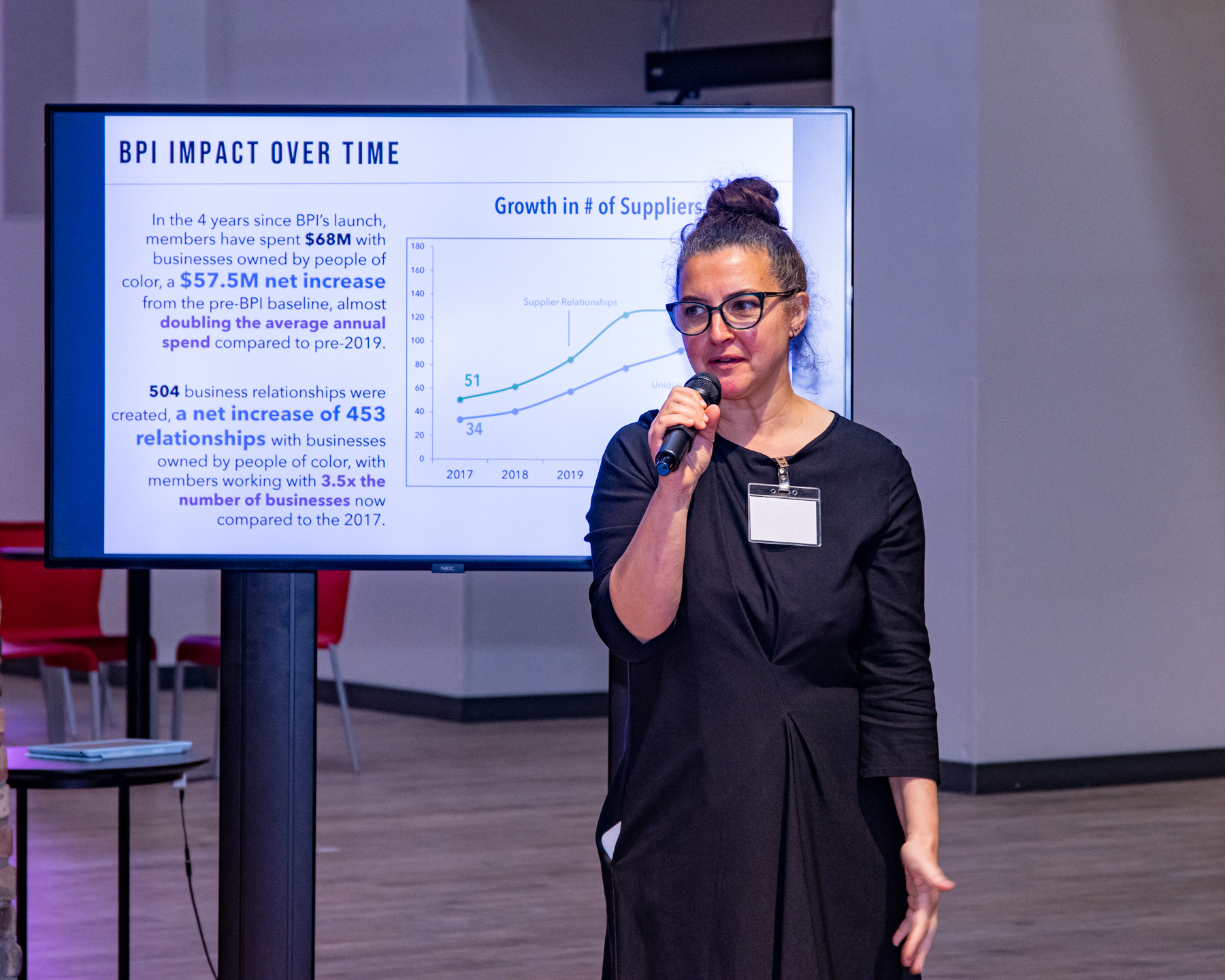Enhancing Racial Equity Through Procurement Practices
Enhancing Racial Equity Through Procurement Practices
Helping Buffalo’s major institutions create a collaborative blueprint for long-term equitable and inclusive procurement.
Spearheaded by the Greater Buffalo Racial Equity Roundtable and Business Leaders Task Force, and funded in part by the Ralph C. Wilson, Jr. Foundation, the Buffalo Purchasing Initiative (BPI) is a procurement focused effort aimed at investing in local businesses owned by people of color.
The project began in 2018 when 12 of Buffalo’s major employers initiated a review of their own purchasing and procurement data. This study revealed that only a fraction of a percent of the several billions of dollars in total annual spending was directed towards local businesses owned by people of color. This included contracting for everything from janitorial services and laundry to catering and information technology consulting: goods and services that Buffalo’s entrepreneurs of color could supply, if they had access to and could navigate the major organizations’ procurement processes.
In Buffalo, people of color have faced stark disadvantages and disparate economic opportunities compared to their white peers.. A dozen major local corporations and institutions saw an opportunity to use their substantial purchasing budgets to support local entrepreneurs of color. However, these partners lacked capacity and knowhow to do so in a coordinated and sustainable way.
U3 Advisors, in partnership with Buffalo’s corporate, institutional and philanthropic leaders, created a blueprint to help organizations purchase more goods and services from local businesses owned by people of color.
The Buffalo Purchasing Initiative has had a catalytic impact on businesses owned by people of color. Between 2019 and 2022, organizations reported a 100% increase in their average annual spending with local businesses owned by people of color. These institutions have also nearly tripled contracts and partnerships with these businesses during the same period.









Notably, Buffalo’s BIPOC population has traditionally experienced higher unemployment, lower wages, and less wealth-building than the city’s white residents and business owners. As “The Racial Equity Dividend: Buffalo’s Great Opportunity,” a white paper issued by the Greater Buffalo Racial Equity Roundtable stated:
“A wealth of research informs us that segregation and racial inequity are bad for individuals, society, and the economy… Because of a web of past and present challenges – formed by the policies and actions of institutions, of lingering place-based segregation, and in conscious and subconscious actions and reactions of everyday people – people of color face disadvantages and disparate opportunities compared to their white peers.”
BPI was formed to address these disparities through more inclusive procurement practices with the goal of sustainably boosting revenues for businesses owned by people of color.
BPI members developed shared goals for increasing their spending, informed by the data analysis. This allowed each participating entity to develop realistic goals based on their unique spending patterns and the availability of suppliers in the region. Eventually, BPI members, supported by U3 Advisors, made direct connections to more local vendors and developed more transparent, mutually beneficial working relationships.
Another critical element of the BPI is its purchasing council, which includes purchasing managers and supplier diversity professionals who meet monthly to exchange best practices, troubleshoot potential barriers to inclusion, and share information on vendors. In conjunction with local business support organizations (BSOs), this council is a useful and timely clearinghouse for referrals for qualified businesses owned by people of color.
Accountability is essential to BPI’s success; participating organizations are supporting businesses owned by people of color and making sure that the goods and services they need are procured without sacrificing quality. The initiative utilizes a dynamic online platform to capture qualitative data so that everyone can track their progress. BPI’s data gathering also now tracks each organization’s outreach to the local community, in addition to finding choke points and bottlenecks that may hinder fulfillment.
U3 Advisors was critical in helping participating organizations move from good intentions to great results. Through BPI, aspirational language about diversity, equity, and inclusion efforts is tied to actionable goals and measurable outcomes. Over the past four years U3 Advisors has not only stood up BPI, but provided ongoing support to the participating institutions’ procurement departments. This capacity-building empowered changes to their business operations and provided the data required to track the impact of inclusion.
Today, participating employers report a high degree of satisfaction about the diverse vendors they can identify to deliver goods and services. Local businesses owned by people of color are able to reinvest their growing receipts in themselves, adding more staff to better service more new customers. More broadly, the techniques and tactics used by BPI are replicable in other markets where large organizations are willing to work together over time to invest locally and learn collaboratively.
BPI has the continued support of the Community Foundation for Greater Buffalo, the Ralph C. Wilson, Jr. Foundation and the Buffalo Niagara Partnership acting as thought leaders and collaborators working to maximize the initiative’s impact. For more information on the Buffalo Purchasing Initiative, visit buffalopurchasing.org

